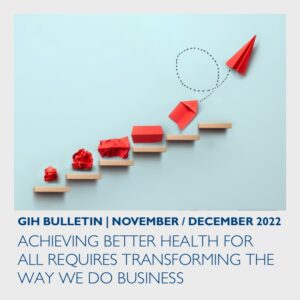Cara V. James, PhD, President and CEO, Grantmakers In Health
This year has been an exciting time of renewal and transition at Grantmakers In Health. We celebrated our 40th anniversary and began implementing an ambitious five-year strategic plan, that included work to identify when and how GIH would use its voice to advance policies that support better health for all and at long last returned to in-person convenings with our annual conference, Fall Forum, and other events. We saw significant shifts in the health policy landscape with the Dobbs decision, state and local efforts targeting the LGBTQ community, the effects of which are still being revealed. We also saw pandemic fatigue; the public health pivot to contain a new virus; the effects of misinformation, climate change, unspeakable gun violence, and unmet mental health needs in our communities; and philanthropy supporting communities in need. With all that is happening, our work and our commitment to the long game has never been more important.
With this top of mind, we are pleased to announce that we recently received an unrestricted gift from philanthropist MacKenzie Scott. We are grateful for this transformative investment in our work, which will strengthen our ability to support health philanthropy and achieve our vision of better health for all through better philanthropy. Although we do not know for sure, our gift as well as the gifts received by other foundations, including 20 GIH Funding Partners1, suggests that Ms. Scott views the broader field of philanthropy as having a role to play in the larger goals she’s advancing in health. We are among the recipients of more than $12 billion in investments she’s made in a wide range of grantees, including long-established organizations with large endowments and newer and smaller organizations to whom her gifts represent game-changing support. Many of the foundations that received money in the latest round of funding focus on health equity and racial justice, as well as rural health.
MacKenzie Scott’s gift and her approach to philanthropy give us much to consider. For GIH, the gift is transformative. While we are still deciding how to make the most of the opportunity we’ve been given, we know that we do not want to continue business as usual. The gift presents an opportunity for us to take a chance and set a truly ambitious goal that could significantly advance health and health philanthropy. However, we must work together to be successful. No one foundation, organization, or sector can solve the challenges we face. To that end, we will be convening the other funders who received gifts to explore opportunities for coordination and collaboration.
MacKenzie Scott’s approach to philanthropy represents a model for philanthropic giving that all in philanthropy should consider as we look to the challenges ahead. One of the themes that came up during our recent Birth Equity Funders Summit in Atlanta was that requiring nonprofits with limited capacity to spend significant time and energy applying for and reporting on grants limits their ability to do the good work we are funding them to do. This has long been at the center of conversations around trust-based philanthropy, and something that many funders are reckoning with.
Rather than require prospective grantees to apply for grants and commit to reporting requirements, Ms. Scott appears to be vetting organizations to make sure they fit into the parameters of the work she’s interested in supporting. Once she decides to invest in an organization, she leaves it to the experts to figure out how best to advance their mission without imposing restrictions. For many years, philanthropy has been focused on metrics to demonstrate impact, whether an initiative is scalable, and that an investment was worthwhile. However, this focus on outcomes limits the ability of the organizations we are funding to have an impact because they are often working with patches of funding rather than a full quilt that allows them to cover more and be more effective. Adopting this approach to philanthropy requires a necessary, but difficult cultural shift. Truly unrestricted funds build organizational capacity and free nonprofits to creatively deploy resources to reach the outcomes we all aspire to.
Structural changes are needed to advance our shared goal of better health for all, and the field’s approach to grantmaking is an important part of that. But it’s not the only facet worth considering—it is increasingly clear that philanthropy can’t sit on the sidelines of health policy. Our ability to achieve our goals is limited by the policy environment we are operating in. If we do not address the systems and structures that contribute to poor health outcomes and inequities, then we are just tinkering at the edges and will be unable to achieve the changes we desire. That means making a commitment to the long game, wading into policy conversations and engaging with the policymakers, and developing a willingness to experiment with new approaches to philanthropy.
We live in uniquely challenging times that call for novel approaches to fulfilling the promise of our mission. The opportunity we have been given will help each of us overcome the challenges ahead. I look forward to continuing the journey towards better health for all with you in 2023.
I wish you and your families a safe, healthy, and happy holiday season and a happy New Year!
1 As of December 1, 2022, GIH is aware of 20 Funding Partners who have received a gift from MacKenzie Scott. They include: California Community Foundation; Con Alma Health Foundation; de Beaumont Foundation — Vose River Charitable Fund; Danville Regional Foundation; Endowment for Health; Episcopal Health Foundation; The Greater Clark Foundation; Greater Watertown Health Foundation; Headwaters Foundation; Health Forward Foundation; Health Foundation of Central and Western New York; Healthcare Georgia Foundation; KFF (Kaiser Family Foundation); Maine Health Access Foundation; Mat-Su Health Foundation; Montana Healthcare Foundation; New Hampshire Charitable Foundation; PATH Foundation; The Rapides Foundation; and Sunflower Foundation.

